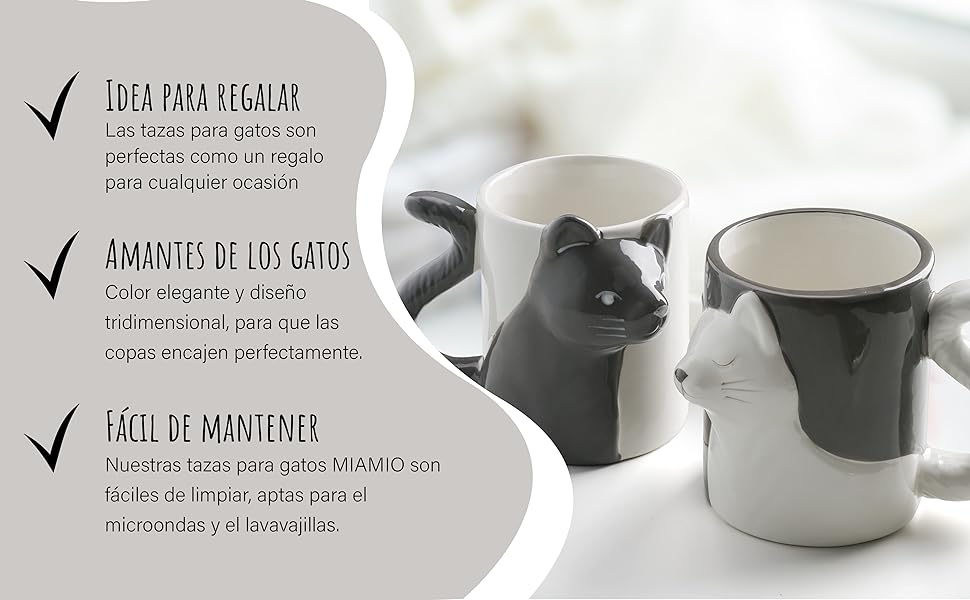
Balvi Mug Kitty Taza en forma de cabeza de gato Capacidad 400ml Apta para lavavajillas y microondas C : Amazon.es: Hogar y cocina

Raguso Taza para Gatos Botella de café Taza de Agua Transparente Resistente al Calor Hervidor de Vidrio con asa para colectores de Tazas Amantes de los Gatos(Blanco) : Amazon.es: Hogar y cocina

Taza de café con diseño de gato, taza de té con tapa y cuchara, de cerámica blanca con diseño de gato en 3D, regalo para amantes de los gatos, colegas, novias, adolescentes

Taza para gatos Taza de vidrio Diseño lindo Tazas de vidrio transparente fino perfectas para café, té y bebidas(Negro) : Amazon.es: Hogar y cocina

Maygone Taza de cerámica de gato rosa, tazas de café con tapa, cucharas de agua, tazas de leche para niñas, niños, mamá, amantes de los gatos, regalo, 280 ml : Amazon.es: Hogar

NA Tazas de Gato - Diseño de Gato Yin Yang - Regalo novedoso para Amantes de los Gatos : Amazon.es: Hogar y cocina

BEE INGENIOUS Taza gato personalizada con nombres. Regalos para mamas gatunas. Regalo para papa gatuno.Tazas Personalizadas de Cerámica Tazas originales. Tazas divertidas (Vida es mejor gatas) : Amazon.es: Hogar y cocina

通用 Adorable taza de cerámica para gato, taza con tapa y cuchara, 400 ml (rosa) : Amazon.es: Hogar y cocina

SPOTTED DOG GIFT COMPANY Juego 4 Tazas de Café Te Originales, Tazas Graciosas Grande Mug, Resistente a Lavavajillas y Microondas, Tazas con Diseño Gatos, Regalos Gatos Mujer Hombre : Amazon.es: Hogar y

Taza de los pares del café del gato del beso,regalo pareja taza de té Regalo para boda nupcial Compromiso Aniversario y matrimonio Matrimonio Aniversario Día de San Valentín : Amazon.es: Hogar y

SPOTTED DOG GIFT COMPANY - Tazas de café - tazas de desayuno con motivo de gatos - juego de 4 - regalos originales para mujeres hombres : Amazon.es: Hogar y cocina

MIAMIO – 2 x Taza de gato/Vasos/Tazas Juego de cerámica, regalo para amantes de los gatos - hombres y mujeres, 350 ml : Amazon.es: Hogar y cocina

Tazas De Café De Porcelana Para Gatos,Tazas De Cerámica Únicas Para Amantes De Los Gatos Con Mango En Forma De Cola - Buy Tazas Y Tazas,Pollo En Forma De Taza,De Cerámica Arrugado

MUGFFINS Taza Gato (Gatito Vida Mejor() - Regalos Originales y Divertidos para Amantes de las Mascotas : Amazon.es: Hogar y cocina

MIAMIO – 2 x Taza de gato/Vasos/Tazas Juego de cerámica, regalo para amantes de los gatos - hombres y mujeres, 350 ml : Amazon.es: Hogar y cocina

Taza linda del gato Taza de café de cerámica con Cuchara de acero inoxidable para gatitos, Hola ~ Taza de café de la novedad Regalo para los amantes del gato Rosado (Azul) :

MUGFFINS Tazas Desayuno Originales graciosas para Amantes de los Gatos - Trabajo Duro para Que mi Gato Tenga una Vida Mejor - Regalo molón Gatos 350 : Amazon.es: Hogar y cocina

Genérico NBG_SUBLIMACIONES Tazas originales para regalar GATO NEGRO, tazas de café, tazas originales para para regalar, tazas Desayuno, taza té, taza personalizada : Amazon.es: Hogar y cocina

Planetacase Taza gato el mejor gato de bengala del mundo - Regalo diseño original tazas gatitos te café desayuno ceramica 330 mL : Amazon.es: Hogar y cocina

MUGFFINS Taza Graciosa - No Siempre Soy Borde, es Broma - 350 ml - Tazas con Frases de Humor sarcástico : Amazon.es: Hogar y cocina

MUGFFINS Taza Gato (Cumpleaños Gatito) - Regalos Originales y Divertidos para Amantes de las Mascotas : Amazon.es: Hogar y cocina

Planetacase Taza gato el mejor gato persa del mundo - Regalo diseño original tazas gatitos te café desayuno ceramica 330 mL : Amazon.es: Hogar y cocina

BigNoseDeer Linda taza de té de cristal de gato, Taza De Agua Bottle con infusor de té en forma de pez, Colador Filtrar Taza de café 250ML (8OZ) : Amazon.es: Hogar y

PROMO SHOP Taza cerámica PERSONALIZADA con el Nombre de tu mascota | Divertido Diseño de Gato PERSONALIZADO | Regalo Taza Gatuna para personalizar con Nombre 350ml : Amazon.es: Hogar y cocina



